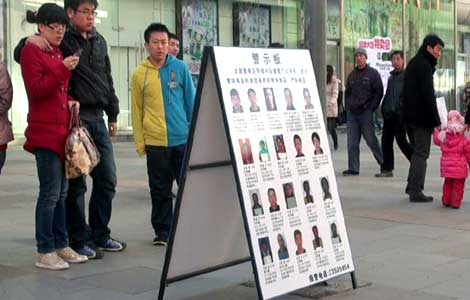 |
|
|
|
|||||||||||
The administration of President Barack Obama set up an independent unit, the Interagency Trade Enforcement Center, last month to probe alleged unfair trade practices of its main partners, including China.
US lawmakers also passed a bill imposing anti-subsidy duties on non-market economy goods on March 13.
Zhou Shijian, a senior trade expert from the Center for US-China Relations at the Beijing-based Tsinghua University, said "the slow recovery of the economy and high unemployment in the US are mainly responsible for the recent surge of trade protection measures against China".
Zhou said: "Amid sluggish economic conditions caused by the financial crisis, the US maintained an unemployment rate above 7 percent (from December 2008 to February 2012). Also, it's easy to target China during a presidential election year."
Zhang added that China's trade surplus with the US, about $150 billion or one-fifth of the US trade deficit, is "often linked with the US high unemployment rate to win support at home".
However, Zhang ruled out a bilateral trade war because both countries "are clear that trade between the two highly-complementary markets benefit both greatly and no one can afford a trade war".
Zhang suggested the government further restructure its economy and narrow the trade surplus with the US.
Zhou urged the Chinese government to go further.
"The establishment of the ITEC runs against world trade rules and China should bring the case to the WTO," Zhou said.
The China Chamber of Commerce for Import and Export of Machinery and Electronic Products said on Wednesday that the solar duty ruling is "unfair and will impede the US solar industry".
The duty rate is lower than analysts had forecast and shows that "Chinese exporters did not receive heavy subsidies from the government".
"Instead, the US government gave huge subsidies, about 20 to 40 percent, to its producers of polysilicon, the raw material sold to Chinese solar panel manufacturers," according to Zhou.
"But the anti-dumping duties against Chinese solar producers, which will be announced on May 16, could be very high and kill the Chinese solar industry if domestic producers do not diversify their overseas markets or explore the huge domestic market," he said.
Wang said that Chinese solar producers could take countermeasures in addition to appealing the preliminary rulings.
Wu Ying, iPad, Jeremy Lin, Valentine's Day, Real Name, Whitney Houston, Syria,Iranian issue, Sanyan tourism, Giving birth in Hong Kong, Cadmium spill, housing policy

|

|

|

|

|

|